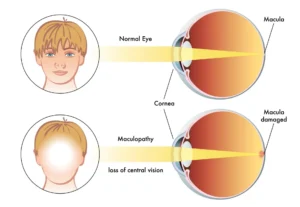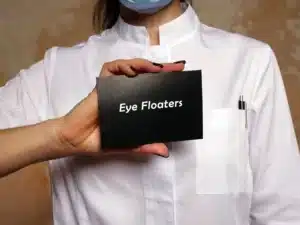The eye is made up of various structures – for example, the retina, optical nerve, lens, iris, pupil, and more – that each play a role in vision and overall eye health. Since these structures are constantly working together, any damage or flaw in any one structure can impair your vision.
Today, we’ll be talking about the vitreous humor, also known as the vitreous fluid, and some of the issues it causes as part of the normal aging process. The vitreous humor is the jelly-like substance that fills the space between the lens and retina – helping to maintain the eye’s shape.
The vitreous humor takes up nearly 80% of the eye’s structure and is made up of 99% water – the other 1% consists of collagen, proteins, salts, and sugars. It’s located in the posterior half of the eye – opposed to the aqueous humor, which is located in the anterior half of the eye.
What Are Floaters & What Do Floaters Look Like?
The natural aging process isn’t always kind to the vitreous humor. Over time, the collagen and other proteins found in the vitreous start to clump together. When this happens, a shadow is cast onto the retina (back of the eye) – these shadows and clumps of proteins are called eye floaters.
Eye floaters appear in your field of vision as tiny black or gray dots, specks, strings, and/or shapes. Some people say it looks like tiny bugs are flying across their field of vision, while other people liken it to wearing glasses with tiny black dots drawn on the lenses, obstructing vision.
For the most part, eye floaters are nothing to worry about and will fade away on their own over time. While they usually don’t require treatment, some cases of floaters can take a turn for the worse. To ensure your floaters are nothing to worry about, speak with your eye doctor.
Symptoms of Eye Floaters & Flashes
Eye floaters are generally more noticeable when looking at a plain bright background – such as the sky, a white wall, or even a ceiling. As you move your eyes up, down, and to the sides, the floaters will move accordingly. Eventually, they’ll start to fade and become less noticeable.
Let’s take a look at some of the most common symptoms of eye floaters:
- Black or gray dots or specks in your field of vision
- Black or gray squiggly lines or strings in your visual field
- The black or gray spots move when you move your eyes
- The black or gray spots are more noticeable against a plain background
- The black or gray spots don’t stick around for long
Your eye doctor won’t always recommend treatment for eye floaters, but that doesn’t mean you should avoid the symptoms. In the event your symptoms are appearing for the first time or are worsening over time, don’t hesitate to schedule an appointment with your eye doctor right away.
Causes of Floaters in Eyes
Earlier, we discussed how eye floaters are caused by the liquifying and clumping of collagen and other protein fibers found in the vitreous humor. The shadow these clumps cast on the retina result in shadows in your visual field – which can be quite the nuisance and distraction at times.
Let’s take a look at some of the most common reasons why eye floaters might appear:
- The natural aging process
- Eye infections and/or eye injuries
- Inflammation (uveitis) or bleeding in the eye
- Vitreous detachment (also called posterior vitreous detachment)
- Retinal detachment or retinal tears
- Complications during or after eye surgery
There are also a number of risk factors that might increase an individual’s chances of noticing floaters in their field of vision – including anyone over the age of 50 years old, those with myopia, eye trauma, complications during cataract surgery, eye inflammation, and diabetic retinopathy.
When Should I Worry About Eye Floaters?
We’ve mentioned several times how eye floaters aren’t always a cause for concern, but that leads many to question – when should I worry about eye floaters? In general, the worrying should begin when you experience sudden eye floaters, a sudden increase in floaters, or when the floaters begin to grow worse.
In the event you notice eye light flashes (like camera flashes) in your visual field – along with floaters – you should seek medical help from an eye doctor immediately. Flashes of light could be a sign of a much larger problem – for example, a detached retina, a retinal tear, or posterior vitreous detachment.
How Are Floaters Diagnosed & Treated?
If you start to experience floaters or flashes in your field of vision, your eye doctor will want to take a closer look at the vitreous and retina. They’ll perform a comprehensive eye exam to get a better idea of the patient’s eye health and will dilate the pupils to get a more clear look inside.
When eye floaters impair an individual’s vision, the eye doctor will recommend one of two treatment options:
- Surgical Procedure – also known as a vitrectomy, your eye doctor can remove the vitreous and replace it with a new gel-like substance to maintain the eye’s shape.
- Laser Treatment – when surgery isn’t required or the patient isn’t a good candidate, your eye doctor can use a laser to break up the floaters and make them less noticeable.
Again, most cases of eye floaters won’t require treatment – though your eye doctor will likely treat any underlying causes (such as bleeding or inflammation). Over time, you’ll notice the floaters less and less, preventing the nuisance – and adjustments – that often come with them.
Are You Worried About Floaters in Your Eyes?
Have you recently noticed floaters or flashes in your visual field? Are you worried that your floaters are a result of a much larger problem? Are you interested in finding a solution to your visual impairment? If you answered ‘yes’ to any of these questions, don’t hesitate to contact us!
At Milwaukee Eye Surgeons, we take pride in helping our patients achieve optimal and ideal vision for as long as possible. Whether you’re worried about floaters, red eyes, glaucoma, cataracts, or any other eye condition that might result in grief, we’re here to assist you!




